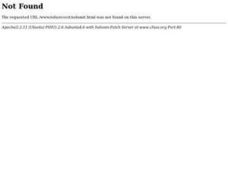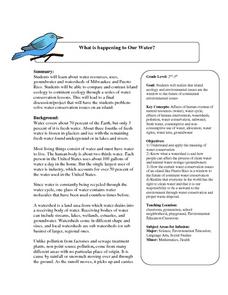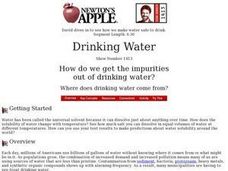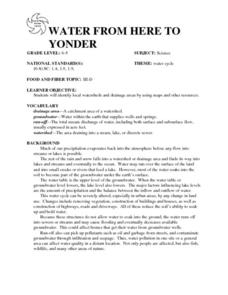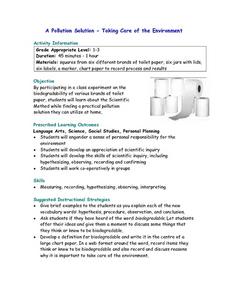Curated OER
Creek Monitoring
Sixth graders conduct a variety of assessments at a local stream to determine if it is a suitable habitat for salmon. They measure temperature, tubidity, dissolved oxygen, pH levels, bacteria and nutrients. In this unit, 6th graders work...
Curated OER
A Limnology Study of Drainage Ditches
Students chemically test water, observe microscopic organisms in the classroom, and screen the sample for macroinvertebrates. They design a reporting sheet that list all the items to be tested and a space to record the results.
Curated OER
Storage, Use, Pollution,& Clean Up of Water
Students synthesize water resource educational posters into class presentations based on the poster's theme. Working in groups, they make presentations on wastewater, water uses, watersheds, groundwater, wetlands,water quality, and...
Curated OER
Global Water
Students collect data on their household water use and calculate how many gallons of water a person uses per day. They investigate how students in different parts of the world get their drinking water.
Curated OER
Where Does Al the Waste Go?
Students construct a sanitary mini-landfill and an open mini-dump. Over a thirty day period, they compare the two methods and determine landfills are envorinmentally safer. They observe a demonstration of burning waste. They create...
Curated OER
Down in the Dumps
After an introduction to municipal sludge, middle school ecologists consider the pros and cons of dumping in the Hudson River Canyon. The class is split into two groups: one to debate in favor or dumping and one to debate against the...
Curated OER
Aerosol Lesson: Science - Graphing SAGE II Data
Students examine and plot atmospheric data on bar graphs.
Curated OER
Acid (and Base) Rainbows
Learners are introduced to the differences between acids and bases and how to use indicators, such as pH paper and red cabbage juice, to distinguish between them. They make predictions that can be answered through scientific...
Curated OER
Marine Debris
Students perform experiments to examine if debris float, or blow in the wind. The effects of these characteristics on the marine debris are then discussed. They determine how a material can influence what becomes marine debris.
Curated OER
Marine Debris
Now is the time to educate tomorrow's citizens to care for the planet, and here is a lesson to help facilitate the process. Collect some marine debris and bring it into class. Have your class separate it into types and then test each...
Curated OER
Pollution Solutions
Young scholars visit a local park to test the quality of the aquatic environments. They search for sources of pollution and examples of pollution control. Based on their obeservations and experiments, they rate their local environment.
Curated OER
Is Dilution the Solution To Pollution?
Students demonstrate the meaning of dilution and concentration and how pollution can affect the water that you drink. They perform an experiment to calculate the final concentration and dilution factor of solutions. They record the color...
Curated OER
Our Water Resources
Students build a model aquifer to study groundwater zones and water table formation. Students use the models to measure the movement of polluted groundwater.
Curated OER
What is Happening to Our Water?
Young scholars compare and contrast Wisconsin's water resources to that of Puerto Rico. They research books about islands, particularly the Puerto Rican islands. Student view illustrations of island ecology. They discuss the...
Curated OER
Is Your Water Clean?
Students compare water quality of different sources. They test water samples for odor, phosphates, pH, bacteria, and dissolved solids. they fill out a data table and answer questions about their findings.
Curated OER
Sea Pollution
Students explore facts about sea pollution. They discover how litter affects marine life. They investigate ways to reduce pollution. They complete a quiz to test their knowledge of sea pollution.
Curated OER
Testing the Waters
Students use test kits to measure the level of chlorine, iron, sulfide, and dissolved oxygen in tap (drinking) water and stream water. They post and evaluate the results of these water quality tests.
Curated OER
Still Waters
Students construct a still to turn seawater into drinking water. They estimate the cost of distilling it. They investigate ways to make the conversion more efficient. They track the source of their home drinking water and make a map of...
Curated OER
WATER FROM HERE TO YONDER
Middle schoolers identify local watersheds and drainage areas by using maps and other resources. They are given copies of the water cycle. Students discuss the movement of water in the environment. They observe, record and transfer...
Curated OER
A Pollution Solution- Taking Care of the Environment
Learners examine the biodegradability of different brands of toilet paper in a hands-on activity. Through this activity they also discover the steps of the Scientific Method and use new terms such as hypothesis, procedure, observation,...
Curated OER
Air Pollution: What's the solution?
In this air pollution worksheet, students compare pictures of effects caused by pollutants. There are 4 questions asked without answers provided.
Curated OER
What's The Flow?
Students examine urban runoff and identify peak flows. They examine causes for different flow rates, and complete worksheets and a graph.
Curated OER
Water Quality and Temperature
Students are led through three activities to explore the effect of temperature fluctuations on the growth and survival of aquatic plants, clams, and shrimp eggs.
Curated OER
Don't Water....Shed A Tear#145
Students examine the definition and attributes of tributaries and watersheds. They design a landscape which includes a mountain, a river, a lake and other appropriate items. They observe as the teacher pours water through the landscape...
Other popular searches
- Water Pollution Worksheets
- Water Pollution Experiments
- Air and Water Pollution
- Sources of Water Pollution
- Air Water Pollution
- Water Pollution Lesson Plans
- Water Pollution Activity
- Bacterial Water Pollution
- Water Pollution Works
- Water Pollution Lesson
- Water Pollution Oil Spills
- Types of Water Contamination






